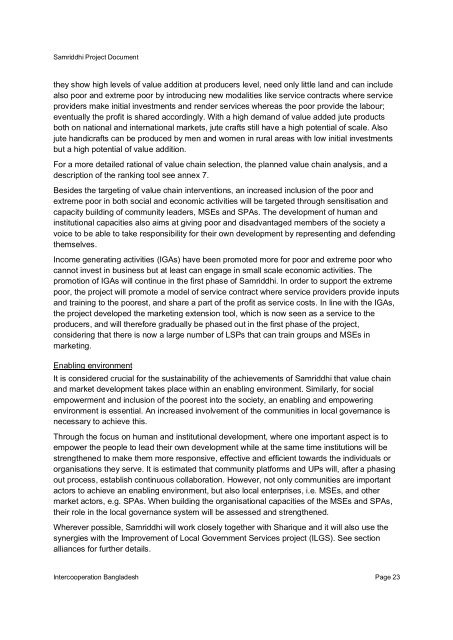Samriddhi
Samriddhi
Samriddhi
Create successful ePaper yourself
Turn your PDF publications into a flip-book with our unique Google optimized e-Paper software.
<strong>Samriddhi</strong> Project Document<br />
they show high levels of value addition at producers level, need only little land and can include<br />
also poor and extreme poor by introducing new modalities like service contracts where service<br />
providers make initial investments and render services whereas the poor provide the labour;<br />
eventually the profit is shared accordingly. With a high demand of value added jute products<br />
both on national and international markets, jute crafts still have a high potential of scale. Also<br />
jute handicrafts can be produced by men and women in rural areas with low initial investments<br />
but a high potential of value addition.<br />
For a more detailed rational of value chain selection, the planned value chain analysis, and a<br />
description of the ranking tool see annex 7.<br />
Besides the targeting of value chain interventions, an increased inclusion of the poor and<br />
extreme poor in both social and economic activities will be targeted through sensitisation and<br />
capacity building of community leaders, MSEs and SPAs. The development of human and<br />
institutional capacities also aims at giving poor and disadvantaged members of the society a<br />
voice to be able to take responsibility for their own development by representing and defending<br />
themselves.<br />
Income generating activities (IGAs) have been promoted more for poor and extreme poor who<br />
cannot invest in business but at least can engage in small scale economic activities. The<br />
promotion of IGAs will continue in the first phase of <strong>Samriddhi</strong>. In order to support the extreme<br />
poor, the project will promote a model of service contract where service providers provide inputs<br />
and training to the poorest, and share a part of the profit as service costs. In line with the IGAs,<br />
the project developed the marketing extension tool, which is now seen as a service to the<br />
producers, and will therefore gradually be phased out in the first phase of the project,<br />
considering that there is now a large number of LSPs that can train groups and MSEs in<br />
marketing.<br />
Enabling environment<br />
It is considered crucial for the sustainability of the achievements of <strong>Samriddhi</strong> that value chain<br />
and market development takes place within an enabling environment. Similarly, for social<br />
empowerment and inclusion of the poorest into the society, an enabling and empowering<br />
environment is essential. An increased involvement of the communities in local governance is<br />
necessary to achieve this.<br />
Through the focus on human and institutional development, where one important aspect is to<br />
empower the people to lead their own development while at the same time institutions will be<br />
strengthened to make them more responsive, effective and efficient towards the individuals or<br />
organisations they serve. It is estimated that community platforms and UPs will, after a phasing<br />
out process, establish continuous collaboration. However, not only communities are important<br />
actors to achieve an enabling environment, but also local enterprises, i.e. MSEs, and other<br />
market actors, e.g. SPAs. When building the organisational capacities of the MSEs and SPAs,<br />
their role in the local governance system will be assessed and strengthened.<br />
Wherever possible, <strong>Samriddhi</strong> will work closely together with Sharique and it will also use the<br />
synergies with the Improvement of Local Government Services project (ILGS). See section<br />
alliances for further details.<br />
Intercooperation Bangladesh Page 23
















